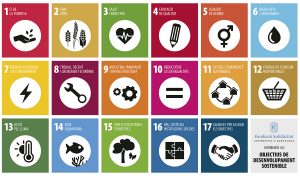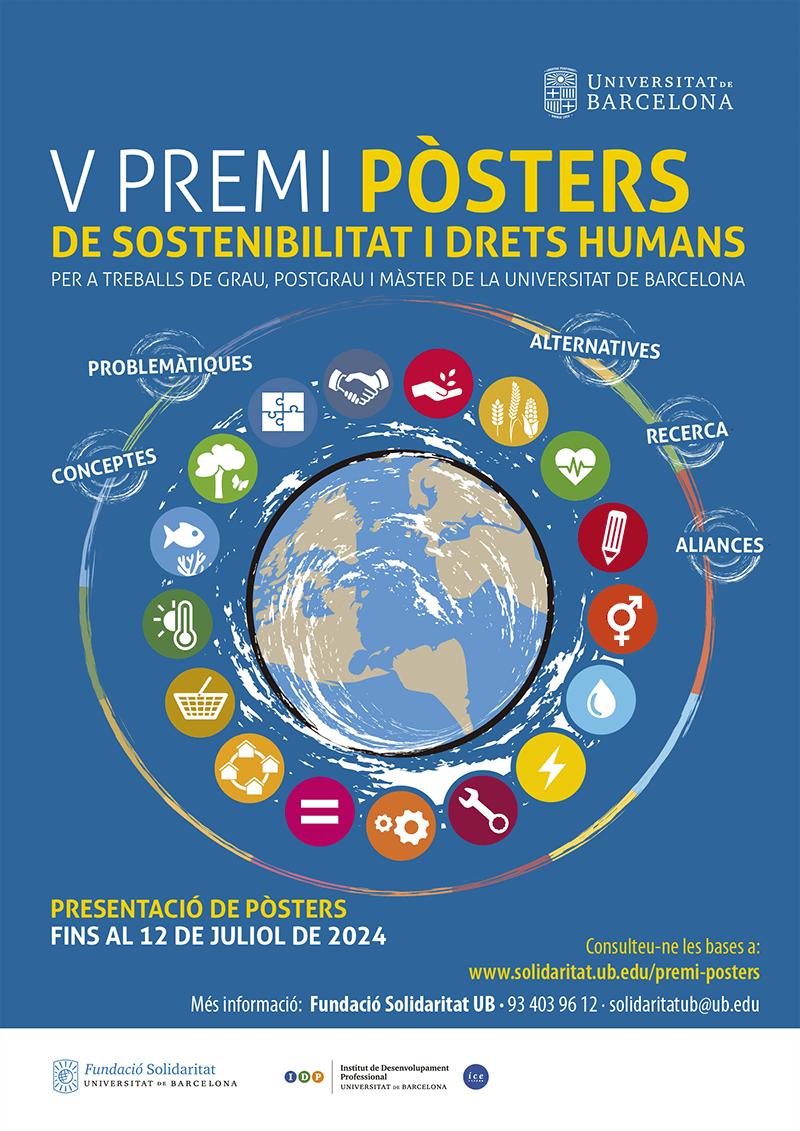 Download the terms
Download the terms
 Download the application form (PDF)
Download the application form (PDF)
 Download the application form (Word)
Download the application form (Word)
Please, send your questions and inquiries to refuge.support@ub.edu
Introduction
In September 2015, the University of Barcelona launched its Support programme for refugees and people from conflict areas (hereinafter the Programme), which is managed by the UB Solidarity Foundation (UBSF).
This Programme incorporates, among other actions, the exemption from the payment of tuition fees for degrees and (official and non inter-university) master’s degrees at the University of Barcelona; Spanish language studies for foreigners; accommodation, as well as access to psychological, legal and medical care services.
However, the most innovative initiative in the framework of the Programme has been the organization of three editions of a Transition course to university studies which, from the conception of providing a comprehensive aid for studies and accommodation, has as its aims to promote the incorporation into undergraduate (last two years of the degree) or master’s degree, from the University of Barcelona, of refugee students or those who are in situations assimilated to that of the refuge, in the terms defined by the High Commissioner for United Nations High Commissioner for Refugees (UNHCR).
This initiative is aimed at non-EU students who are threatened and/or displaced in their countries of origin or refugees in countries of first reception or transit, and is part of what UNHCR defines as complementary and safe routes to resettlement of refugees in third countries. In all three previous editions, as in this one, this is an initiative co-financed by the University of Barcelona, the UB Solidarity Foundation and the Directorate of Global Justice and Cooperation Services of the Barcelona City Council.
1. General purpose of the grants
The grants have three main purposes:
- To promote access to higher education for university students who are refugees or who hold a similar status as defined by the United Nations High Commissioner for Refugees (UNHCR), whose educational and life-time ambitions have been interrupted by armed conflicts or other situations that breach human rights, whether for expressing political opinions or religious beliefs, because of their sexual orientation, gender, for belonging to ethnic or social minorities, or for any other reason.
- To provide alternative avenues that are safe for refugees, in line with the recommendations and in the spirit of those made by UNHCR.
- To bolster job competencies and the future employability of the students, whether in host countries or their countries of origin, whenever they are able and wish to return to them.
The English version of the call for the grants is posted at https://www.solidaritat.ub.edu/terms-for-grants-2019-ub-transitional-course/.
2. Beneficiaries
To be eligible for a grant, applicants must meet the following requirements:
- They must hold refugee or similar status, as defined by UNHCR. This means that applicants must have been forcibly displaced from their place or residence, have suffered persecution or have reasonable fears that they will suffer it, due to a conflict, violence or other circumstances that seriously disturb public order and/or due to their political opinions, religious beliefs, their ethnic or social background, sexual orientation, gender or any other circumstance. In all cases, applicants must prove their situation by way of documents, such as letters from governmental institutions or NGOs, documentation issued by UNHCR or any other United Nations agency, or any other material evidence that can be assessed.
- They are in a situation of vulnerability in terms of exercising human, economic and social rights. In this regard, applicants must provide documentation or other material evidence that make it possible to satisfactorily prove that they are in a situation of vulnerability in their place of residence at the time that they apply for the grant.
- They must be under 30. As an exception, applications from people who are 30 or over will be accepted if they are in a situation of abandonment or vulnerability.
- They must be residents in a non-EU country and may not be nationals of Spain or any other European Union country, nor may they have dual nationality if one of the two is Spanish or from another EU country. Exceptionally, given the extremely serious humanitarian crisis in Afghanistan applications will be accepted from Afghan nationals who are asylum seekers in Spain and who have resided in the country subsequent to 1 August 2021.
- They must not have any previous knowledge of Spanish or Catalan, as one of the specific purposes of the course for which the grant is awarded is for them to learn these two languages.
- They must have made a specific commitment to social issues and global justice.
- They must satisfactorily prove, to the extent required by the University of Barcelona (UB), that they have passed a university course and/or hold a university qualification that enables them to join an official master’s degree course at the UB that is not an inter-university course or the final two years of a degree that they wish to study at the UB. The supporting documentation must have been issued in the original language and in any of the following languages: Spanish, French, Portuguese, Arabic or English. This documentation will be checked before candidates are selected.
- They must apply to join one of the official master’s degree programmes that are not an inter-university course or the final two years of a degree run by the UB, but not by one of its affiliated schools. The UB’s course catalogue is posted at:
As prerequisite to apply for the grant, documentation must be submitted that accredits the courses passed by the applicants, and their financial and social situation.
3. Commitments and obligations of the applicants for receiving a grant
The individuals awarded a grant undertake to:
- Complete the transition course to university studies, accredit that they have benefited from it and, in any event, that they have attended at least 80% of class hours.
- Pass the examinations or relevant tests to reach level B2 in Catalan and Spanish.
- Pass the examinations or relevant tests specific to human rights.
- Take part in all educational activities on the transition course to university studies, and in activities related to the promotion and defence of human rights run by the UB Solidarity Foundation (UBSF), in addition to the activities that are carried out in the framework of the UB’s Support programme for refugees and people from conflict areas.
- Meet the UB’s academic progress requirements if the last two years of a degree course or if a master’s degree is taken immediately after passing the transition course to university studies.
- Process the paperwork required to successfully legalise their situation in Spain or to remain in a legal situation in the case of Afghan nationals who have resided in the country since 1 August 2021.
- Immediately report any incident that affects their legal or academic situation, or that hinders them from doing their studies as normal or that affects their living conditions.
- Immediately disclose any other grants that are awarded or the start of paid work that changes their previously accredited situation of financial insecurity.
- To comply with the rules on shared accommodation in their lodgings.
Points 4 to 9 will continue to be mandatory should the grant cover subsequent courses, as will the fulfilment of the specific terms and conditions of the UB’s academic progress requirements and the legal requisites for remaining in Spain.
4. Purpose of the grants
The 16 grants are intended for students who fulfil the requirements established in point 2 of these rules who wish to continue their university studies and take the last two years of a degree or official master’s degree course at the UB that is not an inter-university course on its course catalogue in academic years 2022–2023 and, if applicable (degree or master’s degree), in 2023–2024, after having passed a transition course to university studies that has been taken in academic year 2021–2022.
The grants are individual and non-transferable, that is, they are awarded to a specific individual. There are no grants for partners or family members.
A total of 16 grants will be awarded for academic year 2021–2022, which cover:
- Exemption from the payment of enrolment fees:
- For the transition course to university studies.
- For a master’s degree or the last two years of a degree for academic years 2022–2023, as per the resolution passed by the Finance Committee of the Board of Trustees of the University of Barcelona on 27 April 2021, provided the transition course to university studies has been passed. This exemption will be subject to at least passing the credits enrolled for, under the terms and conditions established by the UB’s academic progress requirements and the administrative requirements for legally remaining in Spain, and the approval of the application to extend the grant, which must be submitted for every academic year under the terms and conditions that may be introduced at any given time.
- Full board and lodging at the accommodation provided by the University of Barcelona preferably in residential colleges or university halls of residence in rooms shared by 2 or 3 people.
- €100 per month as pocket money.
- Psychological assistance through the resources available to the University of Barcelona and the UBSF.
- Legal advice on immigration matters and asylum through the resources available to the University of Barcelona and the UBSF.
- Private medical insurance, restricted to the coverage in the policy taken out.
- Psycho-emotional assistance, academic guidance and language exchange.
- Participation in programmes and projects for joining social life and associations at the UB, the city of Barcelona and its metropolitan area.
5. Applications
To apply for a grant, the following documentation must be submitted:
- Application form completely filled in. This form is posted at the following link: solidaritat.ub.edu/2019_Scholarship_Application.
- Photocopy of a valid passport.
- Documentation accrediting the university courses passed, as established in point 2 of these rules. The documentation must be submitted in the original language and, if possible, in any of the following languages: Spanish, French, Portuguese, Arabic or English. This documentation will be checked before candidates are selected.
- A cover letter written by each applicant.
- The documentation (letter, certification, legal document or similar) that proves refugee status or an applicant’s need for asylum as defined by UNHCR, namely, applicants must have been forcibly displaced from their place of residence, suffer persecution or have reasonable fears that they will suffer it, due to a conflict, violence or other circumstances that seriously disturb public order and/or due to their political opinions, religious beliefs, their ethnic or social background, sexual orientation, gender or any other circumstance. The documentation must have been issued by government bodies, suitably accredited NGOs or United Nations agencies, and must be provided in any of the following languages: Spanish, French, English, Portuguese or Arabic.
- Documentation (letter, certification, legal document or similar) that proves an applicant’s socio-economic vulnerability. The documentation must have been issued by government bodies, suitably accredited NGOs or United Nations agencies, and must be provided in any of the following languages: Spanish, French, English, Portuguese or Arabic.
All of this documentation must be attached as a PDF to an email and sent to the following address refuge.support@ub.edu. The subject line in the email must be: Name_Surname_Application_ScholarshipUB.
The submission deadline is 22 February 2022, at 12 p.m. (CET).
6. Selection of candidates
The selection of candidates will be made by an Assessment Committee made up of the following people:
- The Vice-Rector for the Internationalisation Policy of the University of Barcelona, who will act as President of the Committee and, if applicable, will have the casting vote.
- The Director of Fundació Solidaritat UB, who will act as the Secretary of the Committee.
- The Director of the transition course to university studies.
- The Coordinator of the UB’s Support programme for refugees and people from conflict areas.
- The Director of Global Justice and Cooperation Services of Barcelona City Council.
- An officer from the Global Justice and Cooperation Services of Barcelona City Council.
An initial selection will be made of candidates based on a review of the documentation received and accepted. To go on to the second phase of the selection process, applicants must have met the requirements set forth in section 2 of these rules. The list of applicants accepted and rejected will be posted on the UB’s e-services portal, as well as the UBSF informing them of this.
Whenever the documentation falls short of requirements or it is considered that a reliable assessment cannot be made of it, the Assessment Committee will require applicants to amend it or submit additional documentation within a maximum deadline of 10 days from the date of publication of the list of applicants accepted and rejected, whereby it will be understood that applicants who fail to submit the documentation as requested have withdrawn their application.
Once the review procedure has been completed, the definitive list of applicants accepted and rejected will be published. The applicants accepted will be invited to a personal interview conducted by an officer from the UBSF in order to assess their personal situation, motivation, and academic and life-time ambitions, who will then issue a report.
Based on the documentation submitted by the applicants and the report issued following the personal interview, the Assessment Committee will hold an official meeting and draw up a list of candidates selected in line with the following criteria, in order of priority:
- Situation of vulnerability from the point of view of suffering violence, persecution or breaches of human rights in general.
- Situation of socio-economic vulnerability.
- Coherence between the academic background and the course to be taken at the UB.
- Personal engagement with human rights.
In the event of the same or similar circumstances, women candidates will be given priority, as gender status is objectively of greater vulnerability in situations of conflict and forced displacement. In this regard, is intended that women candidates account for at least 50% of the total number of people selected.
Following the same criteria, the Assessment Committee will draw up a reserve list of candidates so that, in the event of the withdrawal, waiver, failure or impossibility to obtain a residence visa, on whatever grounds, of the people on the list of selected candidates for the grant, the people on the reserve list, in order of priority, will occupy the vacancies that may arise on the initial list of candidates selected.
The reserve list can be activated until the second week of the start of the transition course. From the third week of the start of the course, even if there are cancellations, these will no longer be covered.
7. Resolutions and notifications
The Assessment Committee will draw up a provisional list of selected and reserve candidates to be submitted to the Rector, who will hand down a Resolution on the provisional award of grants for the transition course to university studies in academic year 2021–2022. The Resolution will be published on the University of Barcelona’s e-service portal and it will also be posted on the UBSF’s website.
The University of Barcelona, through the UBSF, which will process the grants, will contact the applicants selected via email to notify them that they have been awarded the grant.
In any event, the payment of the grant will be sine qua non subject to candidates obtaining a student visa or, if applicable, having their status legalised so that they are able to reside in Spain.
8. Acceptance of grants and procedures for obtaining it
Once notification of the award of the grant has been served, candidates will have 7 working days to provisionally accept it by replying to the email announcing this. Failure to reply will be understood as a waiver of the grant. In the event of the waiver of a grant and, therefore, that there is a free place to be filled, the University of Barcelona, through the UBSF, will contact the first person on the reserve list, and so on in strict order of priority, in order to notify this person of the provisional award of the grant.
Once the grant has been provisionally accepted, the person selected must immediately start to process the relevant paperwork with the Spanish diplomatic and consular authorities in order to obtain a student visa, with the exception of Afghan nationals who fulfil the requirements set out in section 2 of these rules. Neither the University of Barcelona nor the UBSF are able to guarantee that a visa will be granted nor may they influence the visa application process in any shape or form.
The final payment of the grant awarded will be subject to candidates obtaining a student visa, except for Afghan beneficiaries who are seeking asylum (or who have obtained it) and who have lived in Spain subsequent to 1 August 2021, as provided for in section 2 of these rules.
Once beneficiaries have obtained a visa and legalised their residence status, they will proceed to definitively accepting the grant by signing the relevant acceptance document.
During the visa application process, selected candidates will be given assistance from the University of Barcelona, through the UBSF, in order to provide them with the supporting documentation required of them by Spanish diplomatic and consular authorities, as well as to answer any questions they may have about what the grant covers and their status when they arrive in Spain.
The grants do not cover the payment of administrative or other types of fees required for obtaining a student visa. It likewise does not cover travel expenses from the applicants’ place of residence to Barcelona.
9. Payment and management of the grants
The award and management of the grants falls to the UBSF in all of the procedures required.
The payment of the grant may be subject to modifications depending on the following situations:
- If a student started to receive a salary and/or fees for freelance work and/or other income that added to the monthly amount received as pocket money came to a total equal to or higher than 50% of the minimum wage, the student will no longer be paid the pocket money but will continue to receive all other grant payments.
- If a student started to receive a salary and/or fees for work and/or other income that added to the monthly amount received as pocket money came to a total equal to or higher than 100% of the minimum wage, the student will no longer be paid the pocket money or full board and lodging, but will continue to receive all other grant payments.
Beneficiary students of this grant must immediately inform the UBSF if they are paid a salary and/or fees for freelance work and/or other income, as referred to in these rules. Failure to report this information will result in the grant being cut off.
The grant will also be discontinued if income is received or obtained that substantially changes a beneficiary’s financial situation to the extent that this person is no longer in the situation of vulnerability to which obtaining the grant was subject.
10. Grant renewal
To carry on being paid the grant after the first academic year, students must have passed the transition course to university studies. To do so, they must have attended at least 80% of class hours and have passed the examinations or other assessment tests that accredit attaining level B2 in Catalan and Spanish, as well as having passed the examinations and assessment tests that specifically accredit a knowledge of human rights. Furthermore, in order to continue being beneficiaries of the grant after the first academic year, they must have legalised their residence status.
Students who pass the transition course to university studies in academic year 2021–2022 may go on to a university master’s degree course or the last two years of a degree course at the University of Barcelona to be completed over academic year 2022–2023, provided they process the paperwork required to do so and fulfil all academic admissions requirements. Furthermore, once the application for the renewal of the grant has been processed, in the event that it is accepted the grant will be subject to the same terms and conditions as those established for the transition course to university studies, as listed in section 4 of these rules.
The renewal application process must be repeated in the following year by students who passed the course they enrolled for in academic year 2022–2023 if they choose to complete their master’s degree or the last year of a degree course in academic year 2023–2024.
11. Grounds for cutting off the grant
The grant will be immediately cut off if either the University of Barcelona or the UBSF, the body that manages the grants, becomes irrefutably aware of falsehoods in the documentation submitted by a student about her/his academic background, situation of financial and social vulnerability or engagement with human rights and, in general, in respect of accrediting the conditions of eligibility established in section 2 of these rules, notwithstanding, if applicable, taking legal actions for the repayment of the grant that may be claimed.
The grant will also be cut off if any of the following situations arises:
- A student does not complete the transition course to university studies or does not attend at least 80% of class time.
- A student does not pass the transition course to university studies’ examinations or assessment tests.
- A student completes the course for which the grant was awarded.
- A student voluntarily renounces the grant.
- A student fails to fulfil the University of Barcelona’s academic progress requirements for the course taken.
- A student fails to fulfil any of the obligations established in section 3 of these rules.
- A student cheats in the assessment tests for the course taken.
- A student behaves in such a way that seriously affects relations and the respect for other students, lecturers, housemates or staff at the school where she/he studies or at her/his lodgings.
- A student fails to report the information referred to in section 9 of these rules.
In all the above cases, except for the completion of a course or the voluntary waiver of the grant, the UBSF, once it has examined all relevant documentation and subsequent to a formal interview with the person concerned, will issue a report to recommend which measures should be adopted. Based on this report, the Rector of the University of Barcelona may decide to withdraw the grant or to take any other measures deemed necessary.
12. Incompatibility of grants
These grants are incompatible with any other grants, subsidies or scholarships awarded for the same purpose and/or that result in income that makes it possible cover the assistance provided by the University of Barcelona’s grant, as set forth in section 4 of these rules, or that directly covered the assistance given.
Should these additional grants, subsidies or scholarships be partial payments that were unable to cover the assistance provided for in section 4, they would be compatible with the University of Barcelona’s grant, under the same terms and conditions established in section 9 of these rules in respect of the payment of a salary or fees for freelance work.
In the case of Afghan students awarded a grant, while they are paid an allowance under the National Scheme for the Hosting and Integration of Asylum Seekers and Beneficiaries of International Protection, they will be given a partial grant that would cover exemption from the payment of university enrolment fees, academic guidance, psycho-emotional assistance and participation in activities run by the UBSF and the UB. Once the allowances paid under the National Hosting Scheme have come to an end, the UBSF will extend the partial grant to a full one, provided such students have legalised their administrative status and have reported these changes to the UBSF. The extension to a full grant will be immediate in the case of students eligible for it.
Students awarded other grants, subsidies or scholarships must inform the UBSF of this immediately. Failure to report this information will result in the grant being immediately cut off.
13. Acceptance of rules
The submission of an application for this grant implies that these rules have been accepted in full.
By submitting an application, the applicants vouch and accept liability for the veracity of the information, data and documents submitted, and for the performance of the requisites, terms and conditions and undertakings established in these rules.
14. Personal data protection
- The joint data controllers of your personal data are the General Secretary of the University of Barcelona, with postal address at Gran Via de les Corts Catalanes, 585, 08007 Barcelona and email address at secretaria.general@ub.edu, and the UBSF, with postal address at Carrer Melcior de Palau, 140, 08014 Barcelona and email address at solidaritatub@ub.edu.
- The purpose of processing your personal data is to deal with the grants.
- The legal basis is the performance of work carried out in the public interest (Act 1/2003, of 19 February, on universities in Catalonia; Organic Law 6/2001, of 21 December, on Universities; and Act 38/2003, of 17 November, on general subsidies). In respect of special categories of personal data1 that you may provide, the legal basis is your explicit consent, which you may withdraw at any time but which will not be retroactive.
- Your personal data will be kept on record for the time required to discharge the purpose for which they were collected and to weigh up any potential liabilities that may arise from their processing.
- The recipients of your data are the University and the UBSF, as the joint data controllers and, if applicable, the joint data processors. In addition, Barcelona City Council is also a recipient of any data that may be required to fulfil the duties entrusted to it in the framework of the Assessment Committee.
Furthermore, we will post the provisional list of accepted and rejected candidates, the definitive list of accepted and rejected candidates and the resolution on the award of grants on the websites referred to herein with the required data about the beneficiaries and the people on the reserve list.
No other personal data transfer has been anticipated, unless required by law. In such cases, only the data strictly necessary will be submitted. - You are entitled to data access, rectification, erasure, objection, portability and restriction by writing to:
- The postal address of the General Secretary of the University of Barcelona (Gran Via de les Corts Catalanes, 585, 08007 Barcelona), or via email (secretaria.general@ub.edu).
- The UBSF at its postal address (Carrer Melcior de Palau, 140, 08014 Barcelona) or its email (solidaritatub@ub.edu).
You must attach a photocopy of your NIE, passport or other valid document that identifies you.
- If you believe that your rights have not been suitably dealt with, you may report this to the UB’s data protection officer by letter (Gran Via de les Corts Catalanes, 585, 08007 Barcelona) or email (protecciodedades@ub.edu), or to the UBSF’s data protection officer by letter (Carrer Melcior de Palau, 140, 08014 Barcelona) or email (solidaritatub@ub.edu).
- You are also entitled to file a claim with the Catalan Data Protection Authority.
- By submitting an application, the applicant states that she/he has read this data disclosure policy and, in the event that the personal data of third parties were submitted, she/he undertakes to provide them with the content of these rules.








